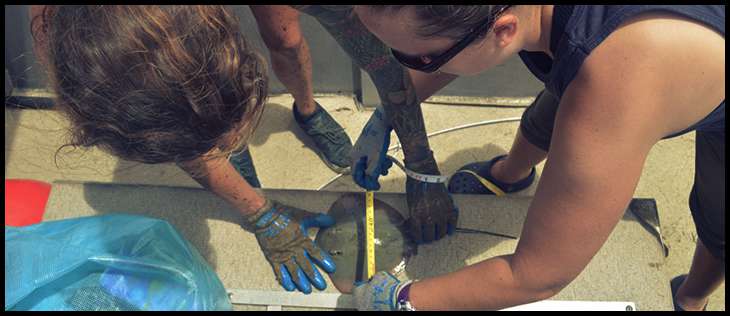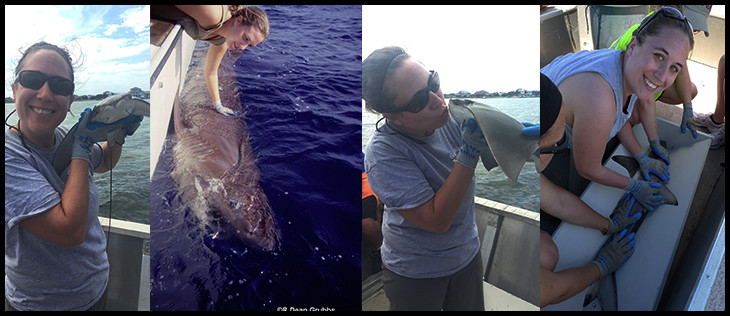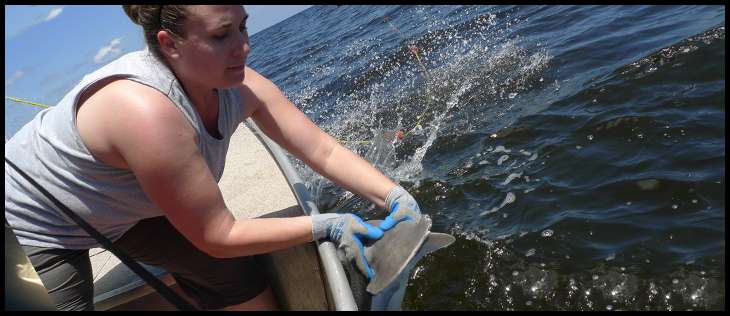If you were a shark, what would you be?
Definitely a great white. If you’re going to be a shark, be as big as you can to avoid being eaten by other sharks. The worst would be a dogfish shark, because they stay pregnant for two years.

Could you summarize what you do for research?
I’ use a combination of genetics and fieldwork to study the evolution of reproductive strategies in sharks, and how these overlap with aspects of ecology and conservation. If I have to give my job a name, I call myself a molecular ecologist or evolutionary geneticist. I spend a lot of my time in the lab, but I also get to go out on the water to tag and collect data on sharks.
What does a typical field day look like?
I’ve done field work in Hawaii, where I got my degree, and in the northern Gulf of Mexico, where I’ve been a professor since 2012. I’ve mostly used two techniques to catch sharks: gillnetting and longlining. On a typical fishing day, my students and I get up really early in the morning to prepare the boat and gear, then we go out to our first site to set either the net in the water. We wait only a little while for the net to soak, then we haul it back in and take data on any fish that we catch. When we get a shark, we measure it, record the species and the sex, and tag it with a short plastic dart tag below the dorsal fin so that anyone who catches the animal can report it to our collaborators at the National Marine Fisheries Service. A small tissue sample is taken from the pelvic fin (which doesn’t hurt the shark) and brought back to the lab for DNA analysis. We do this all day until we’re exhausted or get chased off by thunderstorms.

What inspired you to start doing this?
I’ve always been fascinated with sharks, ever since I was a little girl. My parents don’t even know where I got it from, but they gave me books on sharks and Eugenie Clark, the Shark Lady (the first female shark biologist), because I was so obsessed. I got interested in the evolution of reproductive strategies in graduate school, and sharks are a great model for studying them because they have several different ways of reproducing. Some lay eggs, and some, in fact most, give live birth like mammals. They have external genitalia and internal fertilization, just like us, and mama sharks will be pregnant anywhere from 5 – 24 months. The pups are often born attached to umbilical cords, which break when the pup swims away, leaving them with a little scar, just like our belly button.
Why do you think it’s important?
As top predators, sharks help keep other species healthy by culling the old and sick, like lions. Habitats that have lost their predators are much less diverse and resilient, so losing sharks can be catastrophic for marine ecosystem health. Sharks reproduce very slowly compared to other fishes, and they are slow-growing and long-lived, similar to humans. Unfortunately, these traits make sharks vulnerable to overfishing and local extinction, because they don’t replace themselves very quickly.
What is the hardest thing about doing this?
Getting up at dawn on field days.

What is the most rewarding thing about it?
Not having to dress up when I go to work, and the ability to make my own hours. Getting to share what I’m passionate about with students and the public is also pretty great.
What if others want to help in shark conservation – how can they help?
I wish everyone felt about sharks like I do, because they’d be amazed how cool these creatures are. Most people don’t know that sharks only kill about 3-5 people per year. In contrast, people kill approximately one hundred million sharks per year. Given how slowly they grow and reproduce, many shark species and populations are at risk for extinction. We know just catching a shark on a line can cause it so much stress that it dies soon after, even if it’s released alive, yet people specifically fish for sharks, and sometimes kill them instead of releasing them. People don’t realize that shark may be twenty-five years old and one of a small number of important reproductive individuals in its population, compared with bony fishes. The best thing someone can do when they hook a shark is cut the line as soon as possible. For everyone else, avoid buying products like shark cartilage pills or shark fin soup that feed the devastating practice of illegal shark finning, and write letters of protest to stores and restaurants that carry such things. Also, support federal and state politicians and legislation that support funding for science, because that’s the only way we’re going to learn how best to protect sharks.

Finally, do you have any advice for a young student wanting to study something like this? What would you tell them?
I’d say go for it! Sharks are awesome, and the more people interested in studying them the better! It’s competitive, and a lot of hard work, but in the end, it’s worth it to be doing what you love. I think that the most important qualities you can have are optimism and tenacity. You don’t have to be the smartest or the strongest person out there, but you have to really want it, and you have to be willing to stay focused and work really hard. Even if it’s boring, dirty, wet, cold, or all of those things together. Also, I try and tell everyone that while it’s completely natural to be scared of sharks, you’re statistically more likely to be killed by a Christmas tree, lightning bolt, vending machine, football game, selfie, toilet, icicle, window blind, volcano, or hippopotamus.

































































































